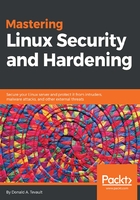
The EPEL repository on the CentOS virtual machine
While the Ubuntu package repositories have pretty much everything that you need for this course, the CentOS package repositories are—shall we say—lacking. To have the packages that you'll need for the CentOS hands-on labs, you'll need to install the EPEL (Extra Packages for Enterprise Linux) repository. (The EPEL project is run by the Fedora team.) When you install third-party repositories on Red Hat and CentOS systems, you'll also need to install a priorities package, and edit the .repo files to set the proper priorities for each repository. This will prevent packages from the third-party repository from overwriting official Red Hat and CentOS packages if they just happen to have the same name. The following steps will help you install the required packages and edit .repo file:
- The two packages that you'll need to install EPEL are in the normal CentOS repositories. Run the command:
sudo yum install yum-plugin-priorities epel-release
- When the installation completes, navigate to the /etc/yum.repos.d directory, and open the CentOS-Base.repo file in your favorite text editor. After the last line of the base, updates, and extras sections, add the line, priority=1. After the last line of the centosplus section, add the line, priority=2. Save the file and close the editor. Each of the sections that you've edited should look something like this (except with the appropriate name and priority number):
[base]
name=CentOS-$releasever - Base
mirrorlist=http://mirrorlist.centos.org/?
release=$releasever&arch=$basearch&repo=os&infra=$infra
#baseurl=http://mirror.centos.org/centos/
$releasever/os/$basearch/
gpgcheck=1
gpgkey=file:///etc/pki/rpm-gpg/RPM-GPG-KEY-CentOS-7
priority=1
- Open the epel.repo file for editing. After the last line of the epel section, add the line, priority=10. After the last line of each remaining section, add the line, priority=11.
- Update the system and then create a list of the installed and available packages by running:
sudo yum upgrade
sudo yum list > yum_list.txt